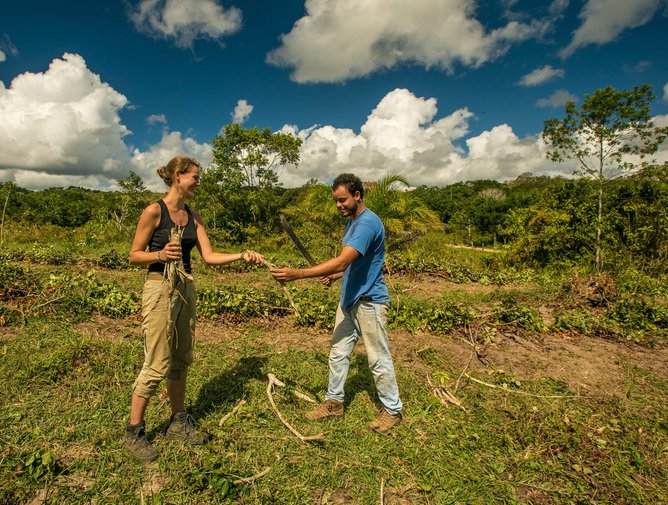ESG regulation: what companies should prepare for in 2024

As we transition from a year of record global temperatures into 2024, it is evident that sustainability has become an ethical imperative.
While a challenging 2023 meant some businesses put sustainability on the back-burner, the reality is that climate action cannot wait – and with new sustainability regulations on the horizon, 2024 will likely see increased action and a shift in mindset.
Many regulations, including new rules in the EU and US, are aimed at making data and progress towards sustainability targets more transparent and standardised – and could mean 2024 is the year many firms get serious about ESG data collection and reporting.
These new rules are likely to mark a shift in how organisations approach ESG, seeing it not just as a compliance and risk management task, but as an opportunity to overhaul their business models.
Beyond carbon emissions, businesses are increasingly looking at ESG through a broader lens, considering the social perspective and the role of nature and biodiversity – and movement on the EU Restoration Law could see acceleration on action taken by companies throughout the year.
And with the game-changing Global Plastics Treaty likely to land later this year, more companies will no doubt be upping the ante on plastic production, reuse, and disposal.
Here, we outline the regulations that should be on your radar in 2024.
EU’s Corporate Sustainability Reporting Directive (CSRD)
A game-changer in standardising non-financial reporting, the new CSRD law comes into force on 1 January 2024. It requires all large companies and listed SMEs that operate in the EU (around 50,000) to report on their climate impact – and begin publishing regular reports in 2025 for the financial year 2024.
This applies to EU companies that meet two of the following (US$40 million in net revenue, US$20 million in assets, 250 or more employees) and non-EU companies that have considerable activity in the EU including a physical presence.
Companies are required to disclose their risks from environmental and social factors to help investors, policymakers and consumers evaluate their performance.
According to Wim Bartels, Senior partner, Europe Lead Sustainability at Deloitte, to fully respond to CSRD, companies need to consider “how implementing requirements extends beyond the immediate compliance exercise and will drive broader changes to strategy, governance, operations and data”.
In particular, companies will need to consider how the requirements affect their approaches to developing decarbonisation pathways and transition plans, align their reporting with strategy and ensure targets are credible, implement improved risk management processes, and set up due diligence processes to identify and mitigate risks in their supply chains. This will in turn bring new evidence of deforestation and facilitate a push toward increased focus on biodiversity.
This new directive also introduces new definitions of materiality, including financial, considering how ESG impacts a company’s finance – welcoming a shift towards increased embedding of sustainability into core business strategy. And it will force companies to really consider their impact on nature, which will lead to an increased focus on nature-positive actions.
While only impacting EU companies, this directive will likely lead the world in new reporting standards.
SEC’s climate disclosure rules
Expected to come into effect in April, the much-delayed but historic US SEC climate-related disclosure will require companies to report on their greenhouse gas emissions and other climate matters.
Last month, December 2023, the Biden administration released rulemaking agendas for the SEC and other agencies, with the commission targeting April 2024 or the climate rules’ finalisation.
With the aim of enhancing and standardising corporate climate-related disclosures for investors and other stakeholders, the new SEC ruling applies to all public companies that file the US 10-K as well as foreign private issuers that file 20-F forms with the SEC.
Under the rule, companies are required to disclose climate change risks to their operations when they file registration statements, annual reports, and other filings.
Described by Wes Bricker, PwC’s US Trust Solutions Co-leader as a “necessary step” in providing investor-grade, decision-useful information, the ruling is also an “important step to prevent greenwashing and to make sure everyone has access to the same quality of information,” Bricker told sister publication Business Chief.
To meet new requirements, many businesses will likely need to transition to investor-grade and tech-enabled reporting to “dramatically accelerate their climate change reporting processes, while implementing effective governance and internal controls”, says Bricker.
And with regards to finance and ESG, A new proposal may emerge in the spring from the U.S. Securities and Exchange Commission (SEC), after it again delayed its climate change disclosure rulemaking.

California’s new Climate Corporate Data Accountability Act (SB253)
By the end of 2024, companies subject to the California’s new Climate Corporate Data Accountability Act (SB253) and SB261 will need to establish processes for auditing their 2025 emissions ahead of 2026 reporting.
These rulings will apply to companies with more than US$1 billion in global revenue to report scope 1, 2, and 3 emissions if they do business in California. Given that most large US-based companies undertake business in the state, these two bills are significant impacting more than 5,000 companies (SB 253) and over 1,000 (SB 261).
Similar legislation is moving forward in other Democrat-led western and northeastern states.
The state is welcoming a raft of new corporate laws in 2024, including a minimum wage increase, expansion of healthcare coverage.
Global Plastics Treaty in 2024
The world’s first agreement to end plastic pollution, the ambitious Global Plastics Treaty may well come into effect by the end of 2024 – with INC-4 meetings expected in April in Ottawa and INC-5 by November in Korea.
Last June, delegates from 180 nations set out a pathway to binding global agreement on tackling plastic pollution. Described as the “most important green deal” since the 2015 international climate agreement, the treaty has an unusually ambitious timescale for globally binding agreement – with the final agreement planned for late 2024.
The world produces almost 400 million tonnes of plastic every year, with an estimated 14 million tonnes escaping into the ocean annually – and global plastic waste expected to rise as high as 408 million metric tonnes by 2040, according to the UN.
“The world is calling for “an agreement that is broad, innovative, inclusive and transparent”, says Inger Andersen, Executive Director of the UN Environment Programme.
The treaty would ensure all governments and businesses play by the same, binding rules for plastic production, reuse, and disposal.
As non-profit global disclosure platform CDP puts it: “If we are to be in with a chance of beating this crisis, companies must be held to account for their plastic-related impacts and pushed to set targets for the reduction of plastic pollution.”
Urgency to act has already spread into the corporate world – and for the first time ever, more than 3,000 companies have chosen to disclose their plastic-related risks, opportunities and impacts, transparently, through the CDP platform.
This treaty could allow companies more space to work together to proactively tackle plastic pollution even where their own governments are slow to implement it.
EU Deforestation Law
Forthcoming EU regulations dedicated to preserving nature and biodiversity will soon necessitate companies to verify that products marketed in the EU do not incorporate commodities originating from recently deforested areas.
Receiving the final green light last May, the EU Deforestation Law aims to curb the EU’s contribution to global deforestation and biodiversity loss.
The deforestation law prohibits EU sales and exports of certain commodities and products associated with deforestation and forest degradation like coffee, cacao, cattle, palm oil, and soy – unless those goods meet strict requirements.
This means that to export to Europe, producers will need to provide proof that their supply chain is entirely free of deforestation – uploading traceability data including GPS coordinates.
Companies have until December 2024 to adjust to the new rules.
This is particularly relevant to Latin America, which is the single biggest exporter of agricultural products to the EU and to Brazil in particular. Around 84% of the Amazon forest is protected by the new EU law, according to a technical note released by MapBiomas.
EU Nature Restoration Law
The enduring emphasis on biodiversity and corporate disclosures related to nature is anticipated, especially following the international treaty endorsed by over 180 nations during the biodiversity COP15 in December 2022. This accord obliges the undersigned parties to mandate reporting on nature-related aspects for large companies by 2030.
Expected to receive a final rubber-stamp by EU members in February 2024, this landmark biodiversity bill will make companies explicitly responsible for what happens all the way back down the supply chain to the source.
Originally proposed in June 2022, this first-of-its-kind law underlines how the economic activities on which millions depend, from fisheries and agriculture to tourism and energy production, are tied to the health of our ecosystems.
In Europe alone, three million companies are highly dependent on at least one ecosystem service. While the WEF estimates that nature-positive products and services could generate up to US$10 trillion annually or businesses, highlighting the huge potential environmental conservation could provide the global economy.
The new law sets an EU-level objective to have nature restoration measures in place on at least 20% of EU land and sea by 2030, and on all ecosystems in need of restoration by 2050.
"To reach these targets, EU countries must restore at least 30 per cent of habitat types covered by the new law to a good condition by 2030, increasing to 60 per cent by 2040, and 90 per cent by 2050," according to a statement from the European Parliament.
Big business including major corporations such as Nestle, Unilever, Salesforce and Coca-Cola, has been a major backer of the law with hopes this will provide a pathway towards robust legislation that will give clear policy direction to businesses and investors.
If the law is adopted in February, it takes the EU one step closer to creating a legislative framework to implementing the Global Biodiversity Framework with ambitious legal targets to help businesses engage.

Sustainable finance Disclosure Regulation (SFDR) – European Parliament
Since 2018, the EU has been building out a sustainable finance framework to channel private funding towards investments that meet the objectives of the European Green Deal.
As part of the EU’s sustainable finance framework, the SFDR came into force a year ago, on January 1, 2023, and will require financial institutions to report on new ESG disclosure requirements, including their financed emissions, by June 2024.
A mandatory disclosure requirement for financial market participants active in the EU, the purpose of the ruling is to make sustainability profile of funds more comparable and better understood by end-investors and encourage the flow of capital into sustainability focused firms.
The SFDR targts financial market participants (FMPs) and financial advisers (FAs).
Sustainability Disclosure Requirements (SDR) – UK FCA
Published in November 2023, the new sustainability disclosure requirements (SDR) and investment labels from the UK Financial Conduct Authority (FCA) comes into force in May 2024.
The ruling targets FCA-regulated firms such as asset managers or owners and contains the FCA’s final rules and guidance to improve trust and transparency to the market for sustainable investment products. The measures include an anti-greenwashing rule to reinforce that sustainability-related claims must be fair, clear and not misleading.
The aim is to improve sustainability information for consumers and address greenwashing.
“Although there will be implementation challenges, the UK’s long-awaited SDR regime has been well-considered, with detailed and demonstrable consultation with asset managers, asset owners, and other financial services stakeholders,” says Hayden Morgan of Pinsent Masons, who advises organisations on sustainability issues.
More regulations to keep an eye on in 2024 – and beyond
This goes into effect Jan. 1 to advance sustainable aviation fuels (SAF) in the European Union. It also requires aircraft operators and EU airports to work towards emission reductions and to ensure a level playing field for airlines and airports.
Corporate Sustainability Due Diligence Directive (CSDDD) – European Parliament
Targeting large EU companies and non-EU companies with large EU undertakings, this new law aims to ensure businesses address advers impact in their value chains globally.
German Supply Chain Due Diligence Act
Already applying to enterprises based in Germany with more than 3,000 employees, or German-registered branches of foreign companies with over 3,000 employees, from January 1, 2024, this act broadens to enterprises based in Germany (or German-registered branches of foreign companies) employing over 1,000 employees. In total, this will now apply to roughly 2,900 companies.
For company executives, this means their supply chains now command the same attention as financial performance as pressure mounts for them to be aware of what is occurring upstream — or face very real reputational, investor and financial risk.






